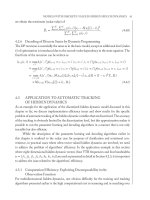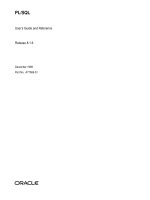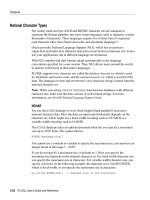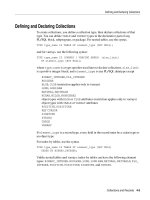The Java Native InterfaceProgrammer’s Guide and Specification phần 7 pps
Bạn đang xem bản rút gọn của tài liệu. Xem và tải ngay bản đầy đủ của tài liệu tại đây (1.26 MB, 32 trang )
JNI FUNCTIONS The JNIEnv Interface
179
Reflection Support
•
FromReflectedField converts instances of java.lang.reflect.Field in
the Java Core Reflection API into field IDs.
FromReflectedField is new in
Java 2 SDK release 1.2.
•
FromReflectedMethod converts instances of java.lang.reflect.Method or
instances of
java.lang.reflect.Constructor into method IDs. From-
ReflectedMethod
is new in Java 2 SDK release 1.2.
•
ToReflectedField and ToReflectedMethod carry out the conversions in the
opposite direction. Both functions are new in Java 2 SDK release 1.2.
The flexibility of an interface pointer makes it easy to evolve (§11.5.2) the
JNIEnv interface. A future version of the JNI specification could introduce a new
interface, say a
JNIEnv2 interface, that is different from the current version of the
JNIEnv. A future virtual machine implementation can maintain backward compat-
ibility by simultaneously supporting both
JNIEnv and JNIEnv2 interfaces. The
return value of the
JNI_OnLoad handler of a native library informs the virtual
machine implementation about the version of the JNI interface expected by the
native library. For example, a native library can presently implement a native
method
Foo.f using a native function Java_Foo_f as follows:
JNIEXPORT void JNICALL
Java_Foo_f(JNIEnv *env, jobject this, jint arg)
{
(*env)-> /* some call to the JNIEnv interface */
}
In the future, the same native method may also be implemented as follows:
/* possible implementation of Foo.f using a hypothetical
* future version (JNI_VERSION_2_0) of the JNI interface */
JNIEnv2 *g_env;
JNIEXPORT jint JNICALL
JNIOnLoad(JavaVM *vm, void *reserved)
{
jint res;
/* cache JNIEnv2 interface pointer in global variable */
res = (*vm)->GetEnv(vm, (void **)&g_env, JNI_VERSION_2_0);
if (res < 0) {
return res;
}
return JNI_VERSION_2_0; /* the required JNI version */
}
jni.book Page 179 Thursday, February 21, 2002 4:36 PM
Simpo PDF Merge and Split Unregistered Version -
Specification of JNI Functions JNI FUNCTIONS
180
JNIEXPORT void JNICALL
Java_Foo_f(jobject this, jint arg)
{
(*g_env)-> /* some call to the JNIEnv2 interface */
}
To highlight interface evolution, we have made the hypothetical future
JNIEnv2 interface different from the JNIEnv interface in a number of ways. The
JNIEnv2 interface need not be thread-local, and thus can be cached in a global
variable. The
JNIEnv2 interface need not be passed as the first argument to the
Java_Foo_f native function. The name encoding convention (§11.3) of native
method implementation functions such as
Java_Foo_f need not be changed. Vir-
tual machine implementations rely on the return value of the
JNI_OnLoad handler
to determine the argument passing convention of native method implementation
functions in a given native library.
13.2 Specification of JNI Functions
This section contains the complete specification of the JNI functions. For each
function, we provide information on the following:
• function prototypes
• a detailed description, including the parameters, return values, and possible
exceptions
• linkage information, including 0-based index for all entries in the
JNIEnv and
JavaVM interface function tables
jni.book Page 180 Thursday, February 21, 2002 4:36 PM
Simpo PDF Merge and Split Unregistered Version -
JNI FUNCTIONS AllocObject
181
AllocObject
Prototype
jobject AllocObject(JNIEnv *env, jclass clazz);
Description Allocates a new object without invoking any of the constructors
for the object. Returns a local reference to the object.
The
clazz argument must not refer to an array class. Use the
New<Type>Array family of functions to allocate array objects.
Use
NewObject, NewObjectV,orNewObjectA to allocate an
object and execute one of its contructors.
Linkage Index 27 in the JNIEnv interface function table.
Parameters
env: the JNIEnv interface pointer.
clazz: a reference to the class of the object to be allocated.
Return Values Returns a local reference to the newly allocated object, or
NULL
if the object cannot be allocated. Returns NULL if and only if an
invocation of this function has thrown an exception.
Exceptions InstantiationException: if the class is an interface or an
abstract class.
OutOfMemoryError: if the system runs out of memory.
jni.book Page 181 Thursday, February 21, 2002 4:36 PM
Simpo PDF Merge and Split Unregistered Version -
AttachCurrentThread JNI FUNCTIONS
182
AttachCurrentThread
Prototype
jint AttachCurrentThread(JavaVM *vm, void **penv,
void *args);
Description Attaches the current thread to a given virtual machine instance.
Once attached to the virtual machine instance, a native thread
has an associated
java.lang.Thread instance. An attached
native thread may issue JNI function calls. The native thread
remains attached to the virtual machine instance until it calls
DetachCurrentThread to detach itself.
Trying to attach a thread that is already attached simply sets the
value pointed to by
penv to the JNIEnv of the current thread.
A native thread cannot be attached simultaneously to two Java
virtual machine instances.
In JDK release 1.1, the second argument receives a
JNIEnv
interface pointer. The third argument is reserved, and should be
set to
NULL. The default java.lang.Thread constructor auto-
matically generates a thread name (for example, "
Thread-123")
for the associated
java.lang.Thread instance. The
java.lang.Thread instance belongs to the default thread
group "
main" created by the virtual machine implementation.
In Java 2 SDK release 1.2, the third argument may be set to
NULL to preserve the release 1.1 behavior. Alternatively, the
third argument may point to the following structure:
typedef struct {
jint version;
char *name;
jobject group;
} JavaVMAttachArgs;
The version field specifies the version of the JNIEnv interface
passed back through the second argument. The valid versions
accepted by Java 2 SDK release 1.2 are
JNI_VERSION_1_1 and
JNI_VERSION_1_2.
If the
name field is not NULL, it points to a UTF-8 string specify-
ing the name of the associated
java.lang.Thread instance. If
the
name field is NULL, the default java.lang.Thread construc-
jni.book Page 182 Thursday, February 21, 2002 4:36 PM
Simpo PDF Merge and Split Unregistered Version -
JNI FUNCTIONS AttachCurrentThread
183
tor generates a thread name (for example, "
Thread-123") for
the associated
java.lang.Thread instance.
If the
group field is not NULL, it specifies a global reference of a
thread group to which the newly created
java.lang.Thread
instance is added. If the group field is NULL, the
java.lang.Thread instance is added to the default thread
group "
main" created by the virtual machine implementation.
Linkage Index 4 in the JavaVM interface function table.
Parameters
vm: the virtual machine instance to which the current thread will
be attached.
penv: a pointer to the location in which the JNIEnv interface
pointer for the current thread will be placed.
args: reserved (in JDK release 1.1) or a pointer to a JavaVM-
AttachArgs
structure (in Java 2 SDK release 1.2).
Return Values Returns zero on success; otherwise, returns a negative number.
Exceptions None.
jni.book Page 183 Thursday, February 21, 2002 4:36 PM
Simpo PDF Merge and Split Unregistered Version -
Call<Type>Method JNI FUNCTIONS
184
Call<Type>Method
Prototype
<NativeType> Call<Type>Method(JNIEnv *env,
jobject obj, jmethodID methodID, );
Forms This family of functions consists of ten members.
Description Invokes an instance method, specified using a method ID, on an
object.
Programmers place all arguments that are to be passed to the
method immediately following the
methodID argument. The
Call<Type>Method function accepts these arguments and
passes them to the method that the programmer wishes to
invoke.
Call<Type>Method <NativeType>
CallVoidMethod void
CallObjectMethod jobject
CallBooleanMethod jboolean
CallByteMethod jbyte
CallCharMethod jchar
CallShortMethod jshort
CallIntMethod jint
CallLongMethod jlong
CallFloatMethod jfloat
CallDoubleMethod jdouble
jni.book Page 184 Thursday, February 21, 2002 4:36 PM
Simpo PDF Merge and Split Unregistered Version -
JNI FUNCTIONS Call<Type>Method
185
Linkage Indices in the
JNIEnv interface function table.
Parameters
env: the JNIEnv interface pointer.
obj: a reference to the object on which the method is invoked.
methodID: method ID denoting the method to be invoked.
Additional arguments
: arguments to be passed to the method.
Return Values The result of calling the method.
Exceptions Any exception raised during the execution of the method.
Call<Type>Method
Index
CallVoidMethod 61
CallObjectMethod 34
CallBooleanMethod 37
CallByteMethod 40
CallCharMethod 43
CallShortMethod 46
CallIntMethod 49
CallLongMethod 52
CallFloatMethod 55
CallDoubleMethod 58
jni.book Page 185 Thursday, February 21, 2002 4:36 PM
Simpo PDF Merge and Split Unregistered Version -
Call<Type>MethodA JNI FUNCTIONS
186
Call<Type>MethodA
Prototype
<NativeType> Call<Type>MethodA(JNIEnv *env,
jobject obj, jmethodID methodID, jvalue *args);
Forms This family of functions consists of ten members.
Description Invokes an instance method, specified using a method ID, on an
object.
Programmers place all arguments to the method in an array of
jvalues that immediately follows the methodID argument. The
Call<Type>MethodA routine accepts the arguments in this
array, and, in turn, passes them to the method that the program-
mer wishes to invoke.
Call<Type>MethodA <NativeType>
CallVoidMethodA void
CallObjectMethodA jobject
CallBooleanMethodA jboolean
CallByteMethodA jbyte
CallCharMethodA jchar
CallShortMethodA jshort
CallIntMethodA jint
CallLongMethodA jlong
CallFloatMethodA jfloat
CallDoubleMethodA jdouble
jni.book Page 186 Thursday, February 21, 2002 4:36 PM
Simpo PDF Merge and Split Unregistered Version -
JNI FUNCTIONS Call<Type>MethodA
187
Linkage Indices in the
JNIEnv interface function table.
Parameters
env: the JNIEnv interface pointer.
obj: a reference to the object on which the method is invoked.
methodID: method ID denoting the method to be invoked.
args: an array of arguments to be passed to the method.
Return Values Returns the result of calling the method.
Exceptions Any exception raised during the execution of the method.
Call<Type>MethodA
Index
CallVoidMethodA 63
CallObjectMethodA 36
CallBooleanMethodA 39
CallByteMethodA 42
CallCharMethodA 45
CallShortMethodA 48
CallIntMethodA 51
CallLongMethodA 54
CallFloatMethodA 57
CallDoubleMethodA 60
jni.book Page 187 Thursday, February 21, 2002 4:36 PM
Simpo PDF Merge and Split Unregistered Version -
Call<Type>MethodV JNI FUNCTIONS
188
Call<Type>MethodV
Prototype
<NativeType> Call<Type>MethodV(JNIEnv *env,
jobject obj, jmethodID methodID, va_list args);
Forms This family of functions consists of ten members.
Description Invokes an instance method, specified using a method ID, on an
object.
Programmers place all arguments to the method in an
args
argument of type va_list that immediately follows the meth-
odID
argument. The Call<Type>MethodV routine accepts the
arguments, and, in turn, passes them to the method that the pro-
grammer wishes to invoke.
Call<Type>MethodV <NativeType>
CallVoidMethodV void
CallObjectMethodV jobject
CallBooleanMethodV jboolean
CallByteMethodV jbyte
CallCharMethodV jchar
CallShortMethodV jshort
CallIntMethodV jint
CallLongMethodV jlong
CallFloatMethodV jfloat
CallDoubleMethodV jdouble
jni.book Page 188 Thursday, February 21, 2002 4:36 PM
Simpo PDF Merge and Split Unregistered Version -
JNI FUNCTIONS Call<Type>MethodV
189
Linkage Indices in the
JNIEnv interface function table.
Parameters
env: the JNIEnv interface pointer.
obj: a reference to an object on which the method is invoked.
methodID: method ID of the method to be invoked.
args: a va_list of arguments passed to the invoked method.
Return Values Returns the result of calling the method.
Exceptions Any exception raised during the execution of the method.
Call<Type>MethodV
Index
CallVoidMethodV 62
CallObjectMethodV 35
CallBooleanMethodV 38
CallByteMethodV 41
CallCharMethodV 44
CallShortMethodV 47
CallIntMethodV 50
CallLongMethodV 53
CallFloatMethodV 56
CallDoubleMethodV 59
jni.book Page 189 Thursday, February 21, 2002 4:36 PM
Simpo PDF Merge and Split Unregistered Version -
CallNonvirtual<Type>Method JNI FUNCTIONS
190
CallNonvirtual<Type>Method
Prototype
<NativeType> CallNonvirtual<Type>Method(
JNIEnv *env, jobject obj, jclass clazz,
jmethodID methodID, );
Forms This family of functions consists of ten members.
Descriptions Invokes an instance method, specified using a class and a
method ID, on an object.
The
CallNonvirtual<Type>Method family of functions and
the
Call<Type>Method family of functions are different.
Call<Type>Method functions invoke the method based on the
real class of the object, while
CallNonvirtual<Type>Method
routines invoke the method based on the class, designated by
the
clazz parameter, from which the method ID is obtained.
The
clazz parameter must refer to the real class of the object or
from one of its superclasses.
Programmers place all arguments that are to be passed to the
method immediately following the
methodID argument. The
CallNonvirtual<Type>Method routine accepts these argu-
ments and passes them to the method that the programmer
wishes to invoke.
CallNonvirtual<Type>Method <NativeType>
CallNonvirtualVoidMethod void
CallNonvirtualObjectMethod jobject
CallNonvirtualBooleanMethod jboolean
CallNonvirtualByteMethod jbyte
CallNonvirtualCharMethod jchar
CallNonvirtualShortMethod jshort
CallNonvirtualIntMethod jint
CallNonvirtualLongMethod jlong
CallNonvirtualFloatMethod jfloat
CallNonvirtualDoubleMethod jdouble
jni.book Page 190 Thursday, February 21, 2002 4:36 PM
Simpo PDF Merge and Split Unregistered Version -
JNI FUNCTIONS CallNonvirtual<Type>Method
191
Linkage Indices in the
JNIEnv interface function table.
Parameters
env: the JNIEnv interface pointer.
clazz: a reference to the class from which the method ID is
derived.
obj: a reference to the object on which the method is invoked.
methodID: a method ID that is valid with the class reference
clazz.
Additional arguments: arguments to be passed to the method.
Return Values Returns the result of calling the method.
Exceptions Any exception raised during the execution of the method.
CallNonvirtual<Type>Method
Index
CallNonvirtualVoidMethod 91
CallNonvirtualObjectMethod 64
CallNonvirtualBooleanMethod 67
CallNonvirtualByteMethod 70
CallNonvirtualCharMethod 73
CallNonvirtualShortMethod 76
CallNonvirtualIntMethod 79
CallNonvirtualLongMethod 82
CallNonvirtualFloatMethod 85
CallNonvirtualDoubleMethod 88
jni.book Page 191 Thursday, February 21, 2002 4:36 PM
Simpo PDF Merge and Split Unregistered Version -
CallNonvirtual<Type>MethodA JNI FUNCTIONS
192
CallNonvirtual<Type>MethodA
Prototype
<NativeType> CallNonvirtual<Type>MethodA(
JNIEnv *env, jobject obj, jclass clazz,
jmethodID methodID, jvalue *args);
Forms This family of functions consists of ten members.
Description Invokes an instance method, specified using a class and a
method ID, on an object.
The
CallNonvirtual<Type>MethodA families of functions and
the
Call<Type>MethodA families of functions are different.
Call<Type>MethodA functions invoke the method based on the
real class of the object, while
CallNonvirtual<Type>MethodA
routines invoke the method based on the class, designated by
the
clazz parameter, from which the method ID is obtained.
The
clazz parameter must refer to the real class of the object or
from one of its superclasses.
Programmers place all arguments to the method in an
args
array of jvalues that immediately follows the methodID argu-
ment. The
CallNonvirtual<Type>MethodA routine accepts the
arguments in this array, and, in turn, passes them to the method
that the programmer wishes to invoke.
CallNonvirtual<Type>MethodA <NativeType>
CallNonvirtualVoidMethodA void
CallNonvirtualObjectMethodA jobject
CallNonvirtualBooleanMethodA jboolean
CallNonvirtualByteMethodA jbyte
CallNonvirtualCharMethodA jchar
CallNonvirtualShortMethodA jshort
CallNonvirtualIntMethodA jint
CallNonvirtualLongMethodA jlong
CallNonvirtualFloatMethodA jfloat
CallNonvirtualDoubleMethodA jdouble
jni.book Page 192 Thursday, February 21, 2002 4:36 PM
Simpo PDF Merge and Split Unregistered Version -
JNI FUNCTIONS CallNonvirtual<Type>MethodA
193
Linkage Indices in the
JNIEnv interface function table.
Parameters
env: the JNIEnv interface pointer.
clazz: a reference to the class from which the method ID is
derived.
obj: a reference to the object on which the method is invoked.
methodID: a method ID that is valid with the class reference
clazz.
args: an array of arguments to be passed to the method.
Return Values Returns the result of calling the method.
Exceptions Any exception raised during the execution of the method.
CallNonvirtual<Type>MethodA
Index
CallNonvirtualVoidMethodA 93
CallNonvirtualObjectMethodA 66
CallNonvirtualBooleanMethodA 69
CallNonvirtualByteMethodA 72
CallNonvirtualCharMethodA 75
CallNonvirtualShortMethodA 78
CallNonvirtualIntMethodA 81
CallNonvirtualLongMethodA 84
CallNonvirtualFloatMethodA 87
CallNonvirtualDoubleMethodA 90
jni.book Page 193 Thursday, February 21, 2002 4:36 PM
Simpo PDF Merge and Split Unregistered Version -
CallNonvirtual<Type>MethodV JNI FUNCTIONS
194
CallNonvirtual<Type>MethodV
Prototype
<NativeType> CallNonvirtual<Type>MethodV(
JNIEnv *env, jobject obj, jclass clazz,
jmethodID methodID, va_list args);
Forms This family of functions consists of ten members.
Description Invokes an instance method, specified using a class and a
method ID, on an object. The
methodID argument must be
obtained by calling
GetMethodID on the class clazz.
The
CallNonvirtual<Type>MethodV families of functions and
the
Call<Type>MethodV families of functions are different.
Call<Type>MethodV functions invoke the method based on the
real class of the object, while
CallNonvirtual<Type>MethodV
routines invoke the method based on the class, designated by
the
clazz parameter, from which the method ID is obtained.
The
clazz parameter must refer to the real class of the object or
from one of its superclasses.
Programmers place all arguments to the method in an
args
argument of type va_list that immediately follows the meth-
odID
argument. The CallNonvirtual<Type>MethodV routine
accepts the arguments, and, in turn, passes them to the method
that the programmer wishes to invoke.
CallNonvirtual<Type>MethodV <NativeType>
CallNonvirtualVoidMethodV void
CallNonvirtualObjectMethodV jobject
CallNonvirtualBooleanMethodV jboolean
CallNonvirtualByteMethodV jbyte
CallNonvirtualCharMethodV jchar
CallNonvirtualShortMethodV jshort
CallNonvirtualIntMethodV jint
CallNonvirtualLongMethodV jlong
CallNonvirtualFloatMethodV jfloat
CallNonvirtualDoubleMethodV jdouble
jni.book Page 194 Thursday, February 21, 2002 4:36 PM
Simpo PDF Merge and Split Unregistered Version -
JNI FUNCTIONS CallNonvirtual<Type>MethodV
195
Linkage Indices in the
JNIEnv interface function table.
Parameters
env: the JNIEnv interface pointer.
clazz: a reference to the class from which the method ID is
derived.
obj: a reference to the object on which the method is invoked.
methodID: a method ID that is valid with the class reference
clazz.
args: a va_list of arguments to be passed to the method.
Return Values Returns the result of calling the method.
Exceptions Any exception raised during the execution of the method.
CallNonvirtual<Type>MethodV
Index
CallNonvirtualVoidMethodV 92
CallNonvirtualObjectMethodV 65
CallNonvirtualBooleanMethodV 68
CallNonvirtualByteMethodV 71
CallNonvirtualCharMethodV 74
CallNonvirtualShortMethodV 77
CallNonvirtualIntMethodV 80
CallNonvirtualLongMethodV 83
CallNonvirtualFloatMethodV 86
CallNonvirtualDoubleMethodV 89
jni.book Page 195 Thursday, February 21, 2002 4:36 PM
Simpo PDF Merge and Split Unregistered Version -
CallStatic<Type>Method JNI FUNCTIONS
196
CallStatic<Type>Method
Prototype
<NativeType> CallStatic<Type>Method(
JNIEnv *env, jclass clazz,
jmethodID methodID, );
Forms This family of functions consists of ten members.
Description Invokes a static method, specified using a method ID, on a
class. The method must be accessible in
clazz, although it may
be defined in one of the superclasses of
clazz.
Programmers should place all arguments that are to be passed to
the method immediately following the
methodID argument. The
CallStatic<Type>Method routine accepts these arguments and
passes them to the static method that the programmer wishes to
invoke.
CallStatic<Type>Method <NativeType>
CallStaticVoidMethod void
CallStaticObjectMethod jobject
CallStaticBooleanMethod jboolean
CallStaticByteMethod jbyte
CallStaticCharMethod jchar
CallStaticShortMethod jshort
CallStaticIntMethod jint
CallStaticLongMethod jlong
CallStaticFloatMethod jfloat
CallStaticDoubleMethod jdouble
jni.book Page 196 Thursday, February 21, 2002 4:36 PM
Simpo PDF Merge and Split Unregistered Version -
JNI FUNCTIONS CallStatic<Type>Method
197
Linkage Indices in the
JNIEnv interface function table.
Parameters
env: the JNIEnv interface pointer.
clazz: a reference to the class object on which the static
method is called.
methodID: the static method ID of the method to be called.
Additional arguments: arguments to be passed to the static
method.
Return Values Returns the result of calling the static method.
Exceptions Any exception raised during the execution of the method.
CallStatic<Type>Method
Index
CallStaticVoidMethod 141
CallStaticObjectMethod 114
CallStaticBooleanMethod 117
CallStaticByteMethod 120
CallStaticCharMethod 123
CallStaticShortMethod 126
CallStaticIntMethod 129
CallStaticLongMethod 132
CallStaticFloatMethod 135
CallStaticDoubleMethod 138
jni.book Page 197 Thursday, February 21, 2002 4:36 PM
Simpo PDF Merge and Split Unregistered Version -
CallStatic<Type>MethodA JNI FUNCTIONS
198
CallStatic<Type>MethodA
Prototype
<NativeType> CallStatic<Type>MethodA(
JNIEnv *env, jclass clazz,
jmethodID methodID, jvalue *args);
Forms This family of functions consists of ten members.
Description Invokes a static method, specified using a method ID, on a
class. The method must be accessible in
clazz, although it may
be defined in one of the superclasses of
clazz.
Programmers should place all arguments to the method in an
args array of jvalues that immediately follows the methodID
argument. The CallStatic<Type>MethodA routine accepts the
arguments in this array, and, in turn, passes them to the static
method that the programmer wishes to invoke.
CallStatic<Type>MethodA <NativeType>
CallStaticVoidMethodA void
CallStaticObjectMethodA jobject
CallStaticBooleanMethodA jboolean
CallStaticByteMethodA jbyte
CallStaticCharMethodA jchar
CallStaticShortMethodA jshort
CallStaticIntMethodA jint
CallStaticLongMethodA jlong
CallStaticFloatMethodA jfloat
CallStaticDoubleMethodA jdouble
jni.book Page 198 Thursday, February 21, 2002 4:36 PM
Simpo PDF Merge and Split Unregistered Version -
JNI FUNCTIONS CallStatic<Type>MethodA
199
Linkage Indices in the
JNIEnv interface function table.
Parameters
env: the JNIEnv interface pointer.
clazz: a reference to the class object on which the static
method is called.
methodID: the static method ID of the method to be called.
args: an array of arguments to be passed to the static method.
Return Values Returns the result of calling the static method.
Exceptions Any exception raised during the execution of the method.
CallStatic<Type>MethodA
Index
CallStaticVoidMethodA 143
CallStaticObjectMethodA 116
CallStaticBooleanMethodA 119
CallStaticByteMethodA 122
CallStaticCharMethodA 125
CallStaticShortMethodA 128
CallStaticIntMethodA 131
CallStaticLongMethodA 134
CallStaticFloatMethodA 137
CallStaticDoubleMethodA 140
jni.book Page 199 Thursday, February 21, 2002 4:36 PM
Simpo PDF Merge and Split Unregistered Version -
CallStatic<Type>MethodV JNI FUNCTIONS
200
CallStatic<Type>MethodV
Prototype
<NativeType> CallStatic<Type>MethodV(
JNIEnv *env, jclass clazz,
jmethodID methodID, va_list args);
Forms This family of functions consists of ten members.
Description Invokes a static method, specified using a method ID, on a
class. The method must be accessible in
clazz, although it may
be defined in one of the superclasses of
clazz.
Programmers should place all arguments to the method in an
args argument of type va_list that immediately follows the
methodID argument. The CallStatic<Type>MethodV routine
accepts the arguments, and, in turn, passes them to the static
method that the programmer wishes to invoke.
CallStatic<Type>MethodV <NativeType>
CallStaticVoidMethodV void
CallStaticObjectMethodV jobject
CallStaticBooleanMethodV jboolean
CallStaticByteMethodV jbyte
CallStaticCharMethodV jchar
CallStaticShortMethodV jshort
CallStaticIntMethodV jint
CallStaticLongMethodV jlong
CallStaticFloatMethodV jfloat
CallStaticDoubleMethodV jdouble
jni.book Page 200 Thursday, February 21, 2002 4:36 PM
Simpo PDF Merge and Split Unregistered Version -
JNI FUNCTIONS CallStatic<Type>MethodV
201
Linkage Indices in the
JNIEnv interface function table.
Parameters
env: the JNIEnv interface pointer.
clazz: a reference to the class object on which the static
method is called.
methodID: the static method ID of the method to be called.
args:ava_list of arguments to be passed to the static method.
Return Values Returns the result of calling the static method.
Exceptions Any exception raised during the execution of the method.
CallStatic<Type>MethodV
Index
CallStaticVoidMethodV 142
CallStaticObjectMethodV 115
CallStaticBooleanMethodV 118
CallStaticByteMethodV 121
CallStaticCharMethodV 124
CallStaticShortMethodV 127
CallStaticIntMethodV 130
CallStaticLongMethodV 133
CallStaticFloatMethodV 136
CallStaticDoubleMethodV 139
jni.book Page 201 Thursday, February 21, 2002 4:36 PM
Simpo PDF Merge and Split Unregistered Version -
DefineClass JNI FUNCTIONS
202
DefineClass
Prototype
jclass DefineClass(JNIEnv *env, const char *name,
jobject loader, const jbyte *buf,
jsize bufLen);
Description Creates a java.lang.Class instance from a buffer of raw class
data representing a class or interface. The format of the raw
class data is specified by The Java™ Virtual Machine Specifica-
tion.
This function is slightly more general than the
java.lang.ClassLoader.defineClass method. This function
can define classes or interfaces with the
null class loader. The
java.lang.ClassLoader.defineClass method is an instance
method and thus requires a
java.lang.ClassLoader instance.
Linkage Index 5 in the
JNIEnv interface function table.
Parameters
env: the JNIEnv interface pointer.
name: the name of the class or interface to be defined.
loader: a class loader assigned to the defined class or interface.
buf: buffer containing the raw class file data.
bufLen: buffer length.
Return Values Returns a local reference to the newly defined class or interface
object, or NULL if an exception occurs. Returns NULL if and only
if an invocation of this function has thrown an exception.
Exceptions ClassFormatError: if the class data does not specify a valid
class or interface.
NoClassDefFoundError: if the class data does not specify the
named class or interface to be defined.
ClassCircularityError: if a class or interface would be its
own superclass or superinterface.
OutOfMemoryError: if the system runs out of memory.
jni.book Page 202 Thursday, February 21, 2002 4:36 PM
Simpo PDF Merge and Split Unregistered Version -
JNI FUNCTIONS DeleteGlobalRef
203
DeleteGlobalRef
Prototype
void DeleteGlobalRef(JNIEnv *env, jobject gref);
Description Deletes the global reference pointed to by gref. The gref argu-
ment must be a global reference, or
NULL. The same non-NULL
global reference must not be deleted more than once. Deleting a
NULL global reference is a no-op.
Linkage Index 22 in the
JNIEnv interface function table.
Parameters
env: the JNIEnv interface pointer.
gref: the global reference to be deleted.
Exceptions None.
jni.book Page 203 Thursday, February 21, 2002 4:36 PM
Simpo PDF Merge and Split Unregistered Version -









